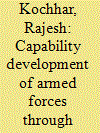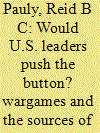| Srl | Item |
| 1 |
ID:
129699


|
|
|
| 2 |
ID:
117688


|
|
|
|
|
| Publication |
2013.
|
| Summary/Abstract |
I investigate a two-country non-cooperative game where the status quo ante is asymmetric as one country is endowed with nuclear weapons while the other is not and is evaluating the opportunity of building up a nuclear arsenal. After identifying the conditions on pay-offs such that the resulting reduced form is a coordination game with two symmetric equilibria, I resort to forward induction to show that the implicit signalling mechanism in it may lead countries to select the peaceful equilibrium in a symmetric environment where both are endowed with analogous arsenals. Then I discuss the possibility for the nuclear power to give in to the rival so as to make the latter indifferent between entering the nuke club or not. This, however, turns out not to be a suitable route in absence of a commitment device or credible enforcement.
|
|
|
|
|
|
|
|
|
|
|
|
|
|
|
|
| 3 |
ID:
155740


|
|
|
|
|
| Summary/Abstract |
In recent decades, instructors have increasingly adopted the use of “serious” games in their classrooms. Typically, these games take the form of role-playing simulations or wargames. However, online computer-run games have opened up new possibilities: to explore complex conceptual relationships, to utilize and display asymmetric information, to be playable anywhere and by anyone, and more. This article describes the game, Dark Networks, and shows why this type of game is valuable as well as how it has been used for pedagogical gains.
|
|
|
|
|
|
|
|
|
|
|
|
|
|
|
|
| 4 |
ID:
025692


|
|
|
|
|
| Edition |
4th ed.
|
| Publication |
Sussex, REG Games Ltd, 1973.
|
| Description |
38p.
|
|
|
|
|
|
|
|
|
|
|
|
Copies: C:1/I:0,R:0,Q:0
Circulation
| Accession# | Call# | Current Location | Status | Policy | Location |
| 014074 | 355.48/WAR 014074 | Main | On Shelf | General | |
|
|
|
|
| 5 |
ID:
162678


|
|
|
|
|
| Summary/Abstract |
Why since 1945 have nuclear weapons not been used? Political scientists have cited five basic reasons: deterrence, practicality, precedent, reputation, and ethics. Scholars attempting to weight these factors face a dearth of empirical data. Declassified records of political-military wargames played by U.S. policymakers, however, open up new avenues for theory testing. An investigation of the willingness of U.S. “strategic elites”—experts with experience in diplomatic or military strategy—to use nuclear weapons in a sample of twenty-six political-military wargames reveals that elite players were reluctant to cross the nuclear threshold against both nuclear-armed and nonnuclear-armed adversaries. The only uses of nuclear weapons in the sample occurred in two wargames with nuclear adversaries. Players’ arguments for restraint in the wargames invoked reputational aversion: decisionmakers feared the opprobrium they would face if they used nuclear weapons. Wargame records also strongly support the power of deterrence and basic practicality—whether conventional weapons could accomplish the same goals—as reasons for widespread hesitation to use nuclear weapons. Precedent and ethical aversions to using nuclear weapons were less common. Finally, players also demonstrated some conformity to what they thought the president expected of them.
|
|
|
|
|
|
|
|
|
|
|
|
|
|
|
|